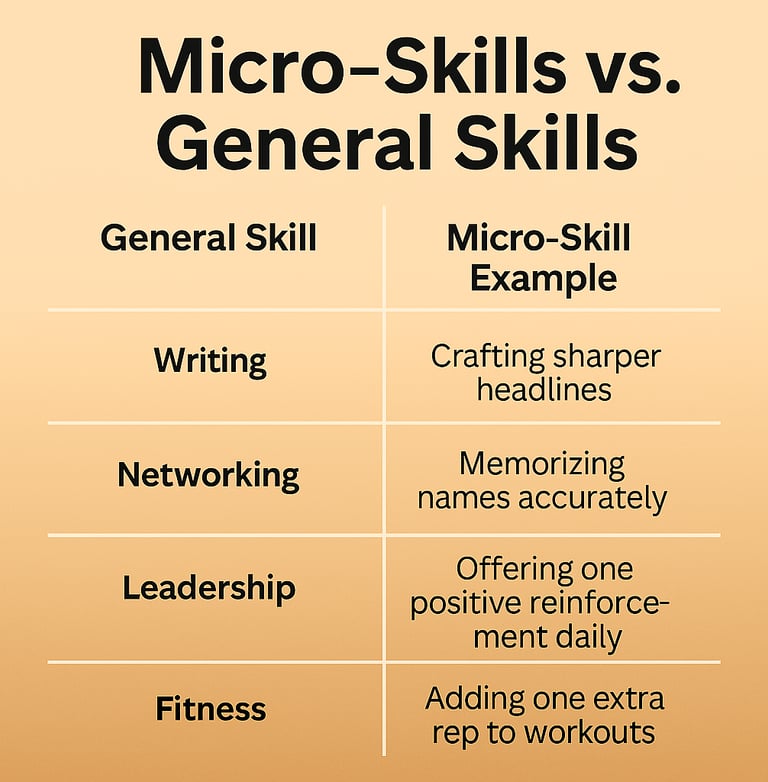Unlock Micro-Skills to Transform Your Career
Discover how micro-skills can transform your career and life. Learn the power of small, intentional improvements that compound into massive success. Master tiny steps for big results today!


The Power of Micro-Skills: How Small Improvements Lead to Big Success
Success often feels like an unattainable summit—something reserved for only the most talented, hard-working, or fortunate individuals. But what if the key to achieving greatness wasn’t a dramatic overhaul of your life or talents, but a series of tiny, intentional steps?
Enter the power of micro-skills—small, manageable improvements that compound over time to create massive results. Instead of trying to master an entire skill overnight, you refine one slight element of that skill every day. Eventually, those improvements transform you into an expert in ways that feel effortless.
This principle applies to learning, career development, relationships, creativity, and personal growth. In this article, we’ll explore:
✅ What micro-skills are and why they matter
✅ How small improvements compound into massive success
✅ Scientific evidence proving that micro-skills speed up progress
✅ Real-world examples of mastery through micro-skills
✅ A step-by-step guide to improving micro-skills in any area
✅ How to stay consistent and avoid common pitfalls
Let’s break it down—because small steps today will redefine your future tomorrow.
1. What Are Micro-Skills?
Micro-skills are tiny, highly specific improvements that make broader abilities easier and more effective. Instead of focusing on a big, daunting goal, micro-skills allow you to sharpen the smallest elements of a task—giving you instant wins without the overwhelm.
💡 Example: Instead of “become a great public speaker,” you focus on ✅ Holding eye contact for five seconds while speaking ✅ Eliminating filler words (“um,” “uh”) ✅ Using pauses effectively
By tackling one aspect at a time, you make rapid progress without burnout.
Characteristics of Micro-Skills:
✅ Precise–You can define and measure them
✅ Quick to practice–5-10 minutes a day is enough
✅ High leverage–Small improvements create huge ripple effects.
2. The Science of Small Improvements
The Marginal Gains Theory
The British Cycling Team transformed their performance using marginal gains—the idea that tiny, consistent improvements lead to massive success. They optimized every single detail: bike aerodynamics, nutrition, sleep cycles, and training techniques. 1% improvements in multiple areas resulted in Olympic gold medals and Tour de France victories.
The Neuroscience of Learning Micro-Skills
Neuroscientists confirm that small, focused learning efforts strengthen neural pathways faster than broad, unfocused training. By focusing on tiny improvements, you:
✔ Trigger dopamine rewards, increasing motivation ✔ Make adjustments quickly through immediate feedback ✔ Strengthen skill memory by reinforcing micro-connections in the brain
This means micro-skills speed up skill development more efficiently than trying to master everything all at once.
3. Micro-Skills in Action: Real-Life Examples
🗣 Public Speaking
🔹 Micro-Skill: Pause for three seconds before answering a question → Boosts confidence and clarity
📈 Productivity
🔹 Micro-Skill: Start every task with a 3-minute outline → Improves focus and execution
🔥 Personal Branding
🔹 Micro-Skill: Respond to one LinkedIn comment daily → Builds credibility over time
💡 Decision-Making
🔹 Micro-Skill: List three potential outcomes before making a choice → Leads to better strategic thinking
All these slight adjustments create long-term success.
4. How to Build Micro-Skills Efficiently
Step 1: Identify Your Key Micro-Skills
What slight improvements would dramatically improve your performance?
What tiny habit can you focus on first?
Step 2: Micro-Practice Daily
Devote 5-10 minutes daily to refining one micro-skill
Track progress in a journal
Step 3: Feedback & Adjustments
Measure your performance weekly
Tweak your approach if results slow down
Step 4: Stack and Expand
Once you master one micro-skill, layer another
Slowly build an arsenal of refined abilities
5. Overcoming Common Pitfalls
⚠️ Perfection Paralysis
🚫 Don’t wait until you feel “ready”—start with small, imperfect steps.
⚠️ Scope Creep
🚫 Keep micro-skills simple—no expanding into bigger goals too soon.
⚠️ Motivation Dips
🚫 Join accountability groups or set challenges with friends to stay on track.
6. How Micro-Skills Lead to Long-Term Success
Imagine you want to become a world-class speaker. Your micro-skill plan might look like this:
🔹 Week 1: Eliminate “um” and “uh” from your speech
🔹 Week 2: Maintain eye contact for at least five seconds before responding
🔹 Week 3: Start and end every talk with a confident smile
🔹 Week 4: Use voice variation to emphasize key points
By Week 5, your presence, clarity, and confidence will skyrocket. You’re not just “learning public speaking”—you’re mastering it through small, intentional changes.
7. Take Your First Step Today
What’s one micro-skill you can start working on right now? Write it down. Start practicing it for five minutes today. Share your progress with a friend, coach, or online community for accountability.
Success isn’t one giant leap—it’s a series of small, relentless steps. Micro-skills are your blueprint. The time to start is now.
🚀 What micro-skill will you develop first? Let me know in the comments!
8. What’s Next?
If you want to go deeper: 📖 Read “Atomic Habits” by James Clear—a book that explains small behavior changes 📋 Start a “Micro-Skill Journal”—track daily improvements in a notebook 🤝 Join a Micro-Skill Mastery Group, team up with others to refine skills together
Your journey toward enormous success through small improvements is only beginning. Keep stacking those micro-skills and watch the compounding magic transform your life.
Let’s go—your future self is waiting! 🚀🔥
Would you like me to refine any section or personalize the examples for a specific field? Let me know how I can tailor this blog further!

